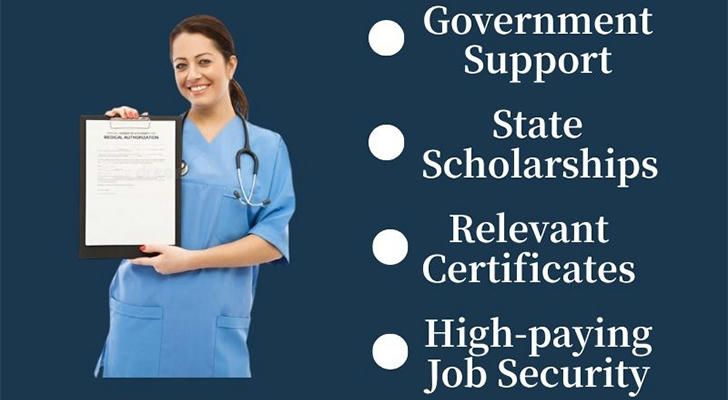Starting from Scratch to Become a Licensed Practical Nurse (LPN): A Complete Guide to Government-Supported Paths in the U.S.
Government support | State Scholarships | Tuition Waivers | Flexible Learning Options

In the United States, becoming a Licensed Practical Nurse (LPN) is a great way to start a stable career in healthcare. To encourage more people to join this important role, federal and state governments offer many types of financial help. These include training grants, scholarships, and job support programs. These efforts lower the barriers to enter the field and help people get the education they need.
1. Why choose to study LPN courses?
LPNs work in hospitals, long-term care homes, and community clinics. They provide basic medical care, manage medications, and watch over patients. According to the U.S. Bureau of Labor Statistics, the number of LPN jobs is expected to grow by 5% from 2022 to 2032. The demand is especially high in areas with many elderly people.
High-demand fields include:
✅ Hospice and long-term care centers.
✅ Elderly care facilities.
✅ Home health care services.
✅ Suburban outpatient and rehab clinics.
2. What Government Support Is Available?
1.WIOA (Workforce Innovation and Opportunity Act) Training Grants The federal government supports WIOA to help adults who need jobs, low-income people, and unemployed individuals get training. This includes support for LPN education.
2.State Scholarships and Tuition Waivers Many states offer scholarships or fee reduction courses for LPN students. Examples:
Kentucky: The Kentucky Board of Nursing gives yearly support for LPN students. New Jersey: The Nursing Education Assistance Program helps low-income people or those changing careers pay for registration fees, books, and more.
3. Basic steps to apply for LPN courses and obtain certification
To get an LPN license, you usually need to:
📌 Confirm eligibility and prepare materials
📌 Choose an LPN program that offers government supporting
📌 Apply for a government-supported program
📌 Apply and be accepted into an LPN program
📌 Enroll and attend the course
📌 Complete the course and receive a certificate
📌 Take the national licensing exam (NCLEX-PN)
4. Recommended Training Schools and Employers
These places offer government-supported LPN programs and help connect students to jobs:
✅ Community College of Philadelphia — LPN program (with WIOA) — Pennsylvania
✅ HCA Healthcare — Training before hiring + tuition reimbursement — Many states
✅ Genesis Healthcare — Paid internships and job offers — Mainly eastern states
✅ Broward Technical College — LPN + CNA dual certification — Florida
5. Flexible Learning Options
Modern LPN programs offer different ways to study:
✨ Online classes for theory, with in-person clinical practice
✨ Night or weekend classes for working people
✨ Accelerated programs to graduate in as little as 9 months
6. Career Growth After Becoming an LPN
Many states have “LPN-to-RN” bridge programs. These help LPNs become Registered Nurses (RNs), with better pay and job security.
LPNs can also specialize in areas like:
✅ Emergency care
✅ Maternity care
✅ Mental health support
✅ Hospice care
7. Real-Life Stories with Third-Party Verification
Case 1: Maria’s Journey from Unemployed to Licensed Practical Nurse in Pennsylvania
Maria was a single mom who lost her retail job. She found the WIOA-supported LPN program at the Community College of Philadelphia. The program covered her tuition and helped with transportation costs. Maria finished in under a year, passed the NCLEX-PN on her first try, and now works at a local hospice. She credits the government supporting for giving her the chance to start a rewarding career.
Third-Party Verification: Community College of Philadelphia confirms that their WIOA LPN program has helped over 200 students like Maria since 2019, with a reported 85% job placement rate within six months of graduation. (Source: Community College of Philadelphia Annual Report 2023)
Case 2: James’ Career Change with New Jersey Nursing Education Assistance Program
James worked in construction but wanted a new career in healthcare. New Jersey’s Nursing Education Assistance Program helped him pay for tuition, books, and exam fees. He took night classes so he could keep working during the day. After getting his LPN license, James got a job at a suburban rehab clinic. He now has a stable income and feels his work is meaningful. The state program made this career change possible.
Third-Party Verification: According to the New Jersey Department of Health, the Nursing Education Assistance Program has supported over 1,000 career changers between 2020 and 2024. An internal survey found that 78% of participants secured healthcare jobs within a year. (Source: New Jersey Department of Health Workforce Report 2024)
8. Conclusion: Let the Government Help You Take the First Step
If you want to work in healthcare but worry about costs or education, check your state government’s website. There are many programs to help you. Government support and community partnerships are opening doors for thousands to start a career as an LPN.
Apply for LPN courses today and create your own skilled industry success story!
